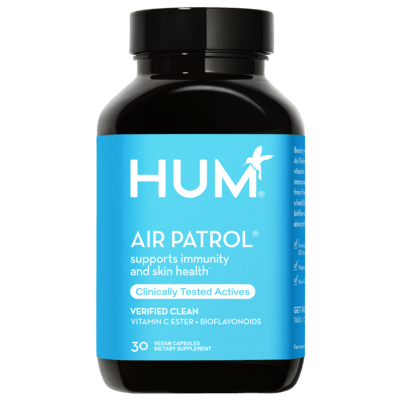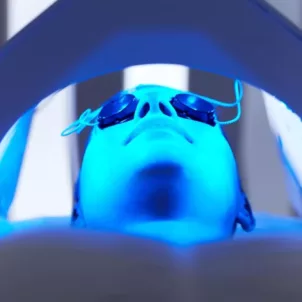Carrie Gabriel, MS, RDN, explains why free radicals are bad for your health. Plus: three ways to reduce free radicals in the body to support long-term wellness.
Your body might be exposed to everyday sources of pollution and other toxins and be able to fend those off, but pesky free radicals can steadily contribute to long-term side effects, including mental health effects, premature aging, and other health concerns. What are free radicals exactly, and what do they do to the body?
Here’s everything you need to know about how to protect yourself from free radical damage.
What Are Free Radicals?
The definition of free radicals are unstable molecules that can damage the cells in your body. They often occur as a result of normal metabolic processes, as well as environmental stressors. As we age, the body loses its ability to combat the effects of free radicals. This results in more free radicals, cell damage, and oxidative stress. (Oxidative stress is an imbalance between free radical production and the body’s ability to neutralize or detoxify the resulting damage.) Exposure to free radicals and resulting damage leads to degenerative processes in the body, including aging.
The Free Radical Theory of Aging

According to the free radical theory of aging, free radicals break down cells over time.
Numerous studies support this theory. The research suggests that free radicals produced in the mitochondria—the powerhouse of our cells—damage the substances that the cell needs to work properly. This damage causes mutations that produce more free radicals, thus accelerating damage to the cell.
This theory helps explain aging, since aging accelerates over time. It offers one explanation on why healthy bodies age and deteriorate as years pass.
Why Are Free Radicals Bad?

In addition to premature aging, numerous undesired issues are associated with the accumulation of free radicals in the body. The side effects of free radicals include skin, digestion, and mental health issues.
Skin Damage
What are free radicals in skin? Well, when it comes to our skin, free radicals cause direct damage to our skin’s DNA, which results in accelerated skin aging. Free radicals can cause cell damage and may appear in several forms on your skin, including:
- Premature wrinkles
- Hyperpigmentation
- Uneven skin tone
- Dull skin
Over time, these side effects of free radicals on your skin can grow to be more noticeable. It’s also worth noting that UV rays are the primary contributors to free radicals in skin, providing yet another good reason to apply SPF daily.
Digestive Issues
Free radicals in foods can disrupt digestion. Oxidative stress is greater when you consume specific types of foods, which can be influenced by the way in which they’re prepared or cooked.
In addition to the free radicals we create naturally through digestion, the biggest dietary culprits of free radicals include processed foods, fried foods, and alcohol.
Mental Health Concerns
Free radicals play a major role in several mental health disorders, including anxiety, depression, and bipolar disorder, by altering fats, proteins, and DNA.
Because the brain is a fat-rich environment, it’s highly receptive to oxidative stress and imbalances. For that reason, it can easily be damaged or compromised.
Certain Types of Cancer
Since free radicals cause oxidative stress, this causes damage to cells–if too many healthy cells die, it can lead to cancer cell development into a tumor. However, it gets complicated, as certain chemotherapy treatments have oxidative stress as a byproduct in order to eradicate a tumor.
Sources of Free Radicals
We encounter free radicals daily through different means. Here are some of their major sources of formation.
Free Radicals In the Body
As previously mentioned, our bodies create these unstable molecules through normal, essential metabolic processes. For instance, when your body uses oxygen, it creates free radicals as a byproduct and results in oxidative stress.
Also, we can create them as we eat and digest food. It’s also worth noting that overeating further increases free radical production. As we eat more, our cells release more activated oxygen than normal, generating higher levels of free radicals.
Free Radicals In Food

Free radicals are found in certain foods, namely:
- Fried foods
- Refined carbohydrates
- Sugars and sweets
- Alcohol
While free radicals do not occur naturally in most foods, they can develop under certain storage and cooking conditions.
For example, deep frying and cooking with lots of fats and oils can lead to the process of oxidation because of the air and heat exposure. Foods that are high in fat and oil content are more prone to oxidation when they’re improperly stored or cooked at high temperatures.
Additionally, foods with preservatives like sausage, bacon, and salami produce more free radicals. Red meat is a notable free radical generator because it has high iron content, which makes it vulnerable to oxidation.
Environmental Exposure
Finally, there are many environmental sources that produce free radicals, including exposure to:
- Air pollutants
- Cigarette smoke
- Pesticides
- UV rays
- Ozone
- Industrial chemicals
How To Reduce Free Radicals In The Body
Some level of oxidative stress is inevitable. However, there are easy, natural ways to reduce free radicals in the body and stave off oxidative stress.
Eat Antioxidant-Rich Foods
Antioxidants—healthful compounds in fruits, vegetables, and healthy fats—can help by neutralizing free radicals.
Foods that pack beta-carotene, lycopene, and lutein particularly aid in free radical reduction. These include:
- Tomatoes
- Corn
- Brussels sprouts
- Carrots
- Collard greens
- Apples
- Mangoes
- Blackberries
- Raspberries
- Strawberries
Additionally, other antioxidant foods with more than one vitamin include spinach, beets, red bell peppers, figs, blueberries, and dark chocolate.
Exercise Regularly
Secondly, studies show that regular exercise alleviates the negative effects of cell damage. Of course, exercise also offers countless overall health benefits, ranging from a reduced risk of mortality causes to a better mood and weight management.
But wait, does exercise cause free radicals? Just note that exercise and free radicals have a nuanced relationship. Exercise at a high-intensity level can contribute to oxidative stress in the body because of muscle fatigue and an increased demand for oxygen once you’re breathing heavily. Fortunately, frequent exercise is also suggested to improve the body’s ability to shield itself against oxidative stress. It can lower free radical production and boost the amount of antioxidant activity since antioxidants reduce free radicals.
Take the Right Supplements
Last but not least, antioxidants such as vitamins A, C, and E, selenium, certain phytonutrients, and polyphenols all help neutralize free radicals. For a daily insurance policy against cell damage, HUM’s Air Patrol can help meet your antioxidant needs.










